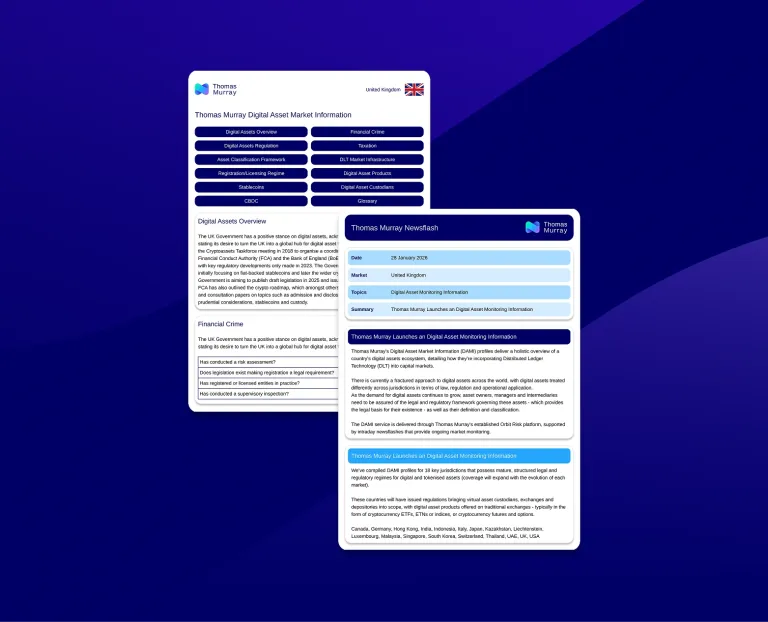Information current as of 29 October 2025
MAS Launches BLOOM Initiative to Enhance Settlement Capabilities
The Monetary Authority of Singapore (MAS) has announced its new BLOOM initiative (Borderless, Liquid, Open, Online, Multi-currency), to extend settlement capabilities offered by financial institutions.
Through BLOOM, MAS will collaborate with the financial services industry to enable settlement in tokenised bank liabilities and well-regulated stablecoins, whilst adopting standardised approaches to better manage risk in digital assets settlement.
IOSCO Publishes Thematic Review on Crypto and Digital Asset Policy Recommendations
The International Organisation of Securities Commissions (IOSCO) has published its final report on the Thematic Review assessing the implementation of its 2023 policy recommendations for crypto and digital asset (CDA) markets.
The review focused on investor protection and market integrity, examining how 20 jurisdictions have adopted IOSCO's recommendations. These recommendations address critical areas including:
- Governance
- Conflicts of interest
- Fraud and market abuse
- Cross-border collaboration
- Asset custody
- Retail client protections
- Transparency
The report acknowledges progress made in regulating crypto-asset markets but stresses the need for further harmonisation of regulatory approaches, reduction of regulatory arbitrage, and the strengthening of enforcement mechanisms.
BoE Publishes Approach to AI, DLT and Quantum Computing
The Bank of England (BoE) has published a report detailing its approach to fostering responsible innovation in artificial intelligence (AI), distributed ledger technology (DLT) and quantum computing in financial services.
The report outlines the BoE’s belief that AI, DLT, and quantum computing could be the most transformative technologies of our time, with the potential to reshape the UK economy and boost productivity, driving productivity growth that can raise real wages, living standards, and overall economic growth. It states that the financial services sector has a critical role to play, both as an adopter of these technologies and as a facilitator, enabling firms across other sectors to do so.
FSB Publishes Thematic Peer Review on Crypto Regulation
The Financial Stability Board (FSB) has released a Thematic Peer Review evaluating how jurisdictions are implementing its 2023 Global Regulatory Framework for Crypto-Asset Activities. The framework includes two sets of high-level recommendations:
- Crypto-Asset Activities and Markets (CA Recommendations): Covering exchanges, wallets, DeFi platforms, and other crypto services.
- Global Stablecoin Arrangements (GSC Recommendations): Focusing on governance, redemption rights, stabilisation mechanisms, and cross-border coordination.
The review assessed jurisdictions’ progress in regulating crypto-asset service providers and stablecoin arrangements, with a focus on data reporting and disclosure frameworks, financial stability risk monitoring, and cross-border cooperation mechanisms.
VARA Consults on the Crypto-Asset Reporting Framework
The Virtual Assets Regulatory Authority (VARA) in Dubai has issued a consultation paper on the implementation of the Crypto‑Asset Reporting Framework (CARF), the new global standard for the automatic exchange of tax information on crypto-asset transactions developed by the OECD.
Key features of CARF include the scope of crypto-assets subject to reporting, identifying Reporting Crypto Asset Providers (RCASPs), entities and individuals subject to data collection and reporting requirements and types of transactions, as well as all the information to be reported.
Feedback will be accepted until 8 November 2025.
PayPal’s Crypto Partner Accidentally Mints $300 Trillion in Stablecoins
PayPal’s blockchain partner, Paxos, has said that it accidentally minted $300 trillion in stablecoins in an internal transfer on 15 October.
Paxos stated that it “immediately identified the error and burned the excess PYUSD”. The US dollar-backed stablecoin, PYUSD, is equal to the US dollar at a ratio of 1:1.
Describing it as “an internal technical error” Paxos confirmed that there had been no security breach and that customer funds are safe.
Three Large Japanese Banks Join Forces to Launch Unified Stablecoin
MUFG Bank, Sumitomo Mitsuio Banking Corp, and Mizuho Bank, who collectively serve more than 300,000 major corporate clients, in tandem with Tokyo-based fintech, Progmat, who will provide the infrastructure for the stablecoin (pegged to the Japanese yen), are aiming to launch the new product in March 2026, following proof-of-concept testing. A US dollar stablecoin is planned to follow. MUFG will be the first major user and plans to integrate the stablecoin into its internal payment systems.
The hope is that greater use of stablecoins will be more efficient than current cross-border payment systems, with costs cut, and greater options for collateral management.
U.S. Bank Forms New Digital Assets and Money Movement Organisation
The United States’ fifth-largest bank and a global leader in payments, U.S. bank, has created a new Digital Assets and Money Movement organization. Its aim is to accelerate the development of and grow revenue from emerging digital products and services like stablecoin issuance, cryptocurrency custody, asset tokenization and digital money movement.
Dominic Venturo, chief digital officer at U.S. Bank said: “Clients increasingly want to understand how digital assets can help them safely move money, store deposits and use tokenized assets, among other potential use cases.” The operation will progress important growth areas of digital assets, establishing and executing the bank’s digital asset strategy and serving as a hub for knowledge and expertise.
Sygnum Bank Middle East Launches Institutional Staking Service from ADGM
Sygnum Bank Middle East has announced the launch of Sygnum Validators, a new service launched from Abu Dhabi Global Market (ADGM). This service includes operating institutional-grade validator nodes for select blockchain networks that enable non-custodial staking. The first validator to launch supports the Solana network and allows eligible SOL token holders to delegate their assets and earn rewards.
This offering strengthens the ADGM’s role as a Web3 hub, as institutional-grade validator nodes are critical to the security and resilience of Web3 networks.
JPMorgan to Allow Crypto to be Used as Collateral
According to Bloomberg, JPMorgan Chase & Co. is to allow institutional clients to begin using Bitcoin and Ethereum as collateral for secured loans, in what is a major shift in how Wall Street's largest bank integrates digital assets into its core lending operations.
This move expands JPMorgan's earlier initiative that accepted crypto-linked ETFs as loan collateral and is set to launch by the end of 2025. A third-party custodian will safeguard the pledged tokens to ensure risk compliance.
Deribit Partners with Komainu to Enable 24/7 Secure Trading of Segregated Assets Under Custody for Institutions
Komainu, the institutional gateway for digital assets, backed by Laser Digital and Blockstream, has announced that Deribit by Coinbase, the world’s largest digital assets options exchange, has joined its collateral management platform, Komainu Connect.
This partnership will enable institutional customers to conduct secure 24/7 trading utilising segregated assets under custody. Clients will be able to hold 100% of their assets in custody with Komainu, a regulated third-party custodian, whilst trading on the exchange, allowing them to better manage their counterparty and settlement risk.
tZERO and Archax Launch Joint Expansion of Global Distribution and Cross-List Digital Assets
tZero Group, a pioneer in blockchain and tokenization for capital markets, and Archax, the UK/EU-regulated digital asset platform, have announced a strategic partnership to cross-list and distribute digital securities and other tokenized real-world assets (RWAs) to expand their global reach. This collaboration opens new distribution channels for issuers and broadens access for investors – delivering greater global connectivity, liquidity, and efficiency in the digital securities ecosystem.
tZERO and Archax will work together to streamline the process for digital securities issuers to list their assets across multiple venues, allowing them to tap into a broader international investor base and provide access to deeper pools of liquidity.

Digital Asset Custodian Monitoring
Our DACM solution sets a standard for transparency and risk intelligence in digital markets. Against an industry that is complex, fragmented, unstandardised, and fraught with cyber risk, our solution provides you with the tools and insights to effectively evaluate, select and monitor your digital asset custodian.
Let’s Talk
Interested in strengthening your approach to digital asset custody?
Get in touch to request a demo, or to talk to one of our experts to find out how Thomas Murray can support your risk evaluation, monitoring, and strategy execution in the digital asset space.
Insights

Why 72 hours is the New Standard for M&A Cyber Due Diligence
A decade ago, cyber due diligence sat somewhere between “nice to have” and “we’ll deal with it post-close.” That world no longer exists.

Thomas Murray Launches Digital Asset Market Information (DAMI)
Thomas Murray, a global leader in risk management, due diligence, and cybersecurity services, is proud to announce the launch of Digital Asset Market Information (DAMI).

Solving the "Scale Paradox": How to Automate Portfolio Oversight with Fewer People
In 2026, private equity technical teams are facing a "Scale Paradox": portfolios are growing in complexity, while in the internal teams responsible for operations and cybersecurity oversight, headcounts remain stagnant.

How Private Equity Hackers Choose Their Targets
Private equity firms sit at the intersection of high-value financial transactions, sensitive deal data, and an expanding portfolio of technology heavy portfolio companies – and it’s this combination that makes PE an attractive target for cyberthreat actors.

